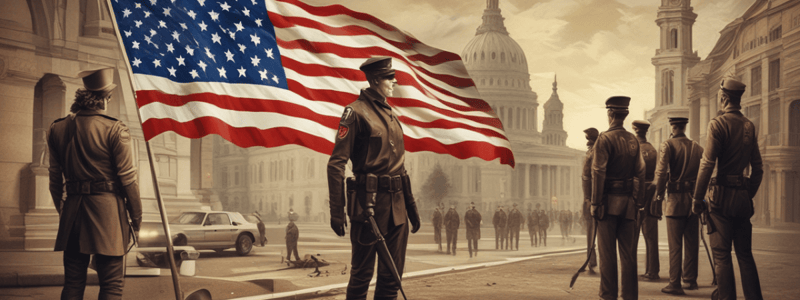Podcast
Questions and Answers
What is the first element that must be established to prove negligence against police?
What is the first element that must be established to prove negligence against police?
- A breach of duty
- Actual damage or injury
- A legal duty (correct)
- Proximate cause
Which of the following is a common form of intentional tort against the police?
Which of the following is a common form of intentional tort against the police?
- Involuntary detention
- Negligent conduct
- False arrest (correct)
- Malicious prosecution
What percentage of police encounters with suspected criminals could potentially lead to civil litigation?
What percentage of police encounters with suspected criminals could potentially lead to civil litigation?
- 0.1% (correct)
- 10%
- 1%
- 50%
What could be a consequence for law enforcement officers with an exaggerated fear of personal liability?
What could be a consequence for law enforcement officers with an exaggerated fear of personal liability?
What is the time frame typically expected for a civil liability case against police to reach final disposition?
What is the time frame typically expected for a civil liability case against police to reach final disposition?
What is required to establish a claim of false arrest by the police?
What is required to establish a claim of false arrest by the police?
Which of the following situations would most likely constitute an invasion of privacy?
Which of the following situations would most likely constitute an invasion of privacy?
What percentage of cases against police is settled outside of court?
What percentage of cases against police is settled outside of court?
What is the primary obligation of police under the Duty to Warn and Protect?
What is the primary obligation of police under the Duty to Warn and Protect?
Which court ruling is most likely to affect an officer's ability to claim qualified immunity for misconduct?
Which court ruling is most likely to affect an officer's ability to claim qualified immunity for misconduct?
What does the Special Duty of Care entail for law enforcement officers?
What does the Special Duty of Care entail for law enforcement officers?
In negligence claims against police, what must a plaintiff demonstrate regarding breach of duty?
In negligence claims against police, what must a plaintiff demonstrate regarding breach of duty?
What is often the outcome when a court evaluates a general duty of care related to self-inflicted injuries?
What is often the outcome when a court evaluates a general duty of care related to self-inflicted injuries?
What factor determines the foreseeability of suicide in a legal context?
What factor determines the foreseeability of suicide in a legal context?
Which of the following best describes the relationship between police supervision and detainee care?
Which of the following best describes the relationship between police supervision and detainee care?
How do courts typically function in relation to changes in police and civil liability laws?
How do courts typically function in relation to changes in police and civil liability laws?
What does the Special Relationship Doctrine imply regarding state liability for third-party victimization?
What does the Special Relationship Doctrine imply regarding state liability for third-party victimization?
In which case were police held liable for leaving children unattended?
In which case were police held liable for leaving children unattended?
What is a significant legal barrier to negligence claims against police for failure to arrest a drunk driver?
What is a significant legal barrier to negligence claims against police for failure to arrest a drunk driver?
Under which circumstances can police and city be held liable for not protecting a victim of third-party violence?
Under which circumstances can police and city be held liable for not protecting a victim of third-party violence?
Which of the following is a component of the Four Zones of Negligence?
Which of the following is a component of the Four Zones of Negligence?
What element is NOT considered a factor in establishing a special relationship between police and individuals?
What element is NOT considered a factor in establishing a special relationship between police and individuals?
What effect does contributory negligence have on claims against police?
What effect does contributory negligence have on claims against police?
Which doctrine maintains that police have no duty to protect the general public unless a specific relationship exists?
Which doctrine maintains that police have no duty to protect the general public unless a specific relationship exists?
Study Notes
Governmental Liability and Public Duty Doctrine
- Public Duty Doctrine indicates police have no obligation to protect the general public unless a "special relationship" exists.
- Special Relationship Doctrine allows for state liability in cases of third-party victimization if the state has custody of the plaintiff against their will.
Police Liability Cases
- Police often gain qualified immunity in abandonment cases.
- In White v. Rockford, police were held liable for leaving children abandoned post-arrest of their caretaker.
- Police and city can be liable for failing to protect victims if they provided assurances or made promises of protection, especially if the victim altered behavior based on these assurances.
Negligence and Law Enforcement
- Four zones of negligence include justifications for pursuit, actual vehicle operation, circumstances of operation, and external factors.
- Contributory negligence can bar recovery against police if the plaintiff's actions contributed to the harm.
- Sovereign immunity and the distinction between ministerial and discretionary actions create barriers against negligence claims.
Special Relationships
- Special relationships lack a precise legal definition, but they often arise from state legislation or specific incident circumstances indicating a duty to a particular class of individuals.
Trends in Police Civil Liability
- Civil suits against police have increased significantly since the 1960s, along with successful litigations and judgments against police.
Negative Effects of Civil Liability
- Civil liability can negatively impact police morale, erode trust, alienate them from the public, and create barriers to understanding complex situations.
Legal Proceedings and Timeframes
- Civil liability cases against police typically take 3 to 10 years from the incident to conclusion.
- Direct verdicts occur when there is a lack of evidence for the jury's verdict.
Police Encounters and Litigation
- Only about 0.1% of police interactions with suspected criminals lead to civil litigation.
- Four elements to establish negligence include legal duty, breach of duty, proximate cause, and actual damage.
Intentional Torts Against Police
- Common intentional torts include wrongful death, assault, battery, false arrest, invasion of privacy, and intentional infliction of emotional distress.
- Establishing false arrest requires proving willful detention without authority.
Invasion of Privacy
- Involves three elements: intrusion, highly offensive conduct, and existence of a legitimate expectation of privacy.
Lawsuit Statistics
- An estimated 15-25% of officers may face lawsuits, with frivolous lawsuits lacking an arguable basis in law or fact.
- Only 4-8% of lost suits occur, with 25% settled out of court.
Police Duty and Legal Aspects
- Police have established duties to warn and protect, render assistance, investigate traffic accidents, and secure accident scenes.
- Special duty of care exists for persons in police custody, applicable outside jail settings as well.
Liability for Self-Inflicted Injuries
- General duty of care typically does not result in liability for self-inflicted injuries or suicides as these are generally considered intentional actions.
Foreseeability and Supervision
- Foreseeability in suicide cases involves reasonable anticipation of harm based on certain factors.
- Police are expected to exercise reasonable care for detainees, with standards varying by state on the extent of supervision required.
Changing Legal Landscape for Officers
- As legal principles become more defined, fewer officers are likely to receive qualified immunity for misconduct.
- Courts tend to follow societal changes rather than lead reform in police or civil liability.
Studying That Suits You
Use AI to generate personalized quizzes and flashcards to suit your learning preferences.
Related Documents
Description
This quiz explores key concepts in governmental liability specifically regarding the Public Duty Doctrine and the Special Relationship Doctrine. It examines scenarios in which police have a duty to protect individuals and the implications of qualified immunity in law enforcement actions. Test your understanding of these legal principles related to victimization and custody.




